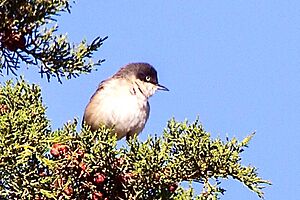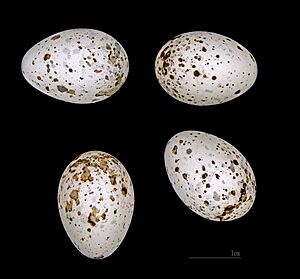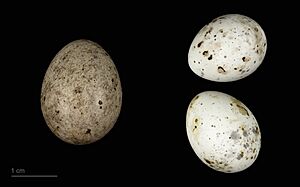Western Orphean warbler facts for kids
Quick facts for kids Western Orphean warbler |
|
|---|---|
 |
|
| In Morocco | |
| Conservation status | |
| Scientific classification |
|
| Kingdom: | Animalia |
| Phylum: | Chordata |
| Class: | Aves |
| Order: | Passeriformes |
| Family: | Sylviidae |
| Genus: | Curruca |
| Species: |
C. hortensis
|
| Binomial name | |
| Curruca hortensis (Gmelin, 1789)
|
|
| Script error: The function "autoWithCaption" does not exist. | |
| Synonyms | |
|
|
Script error: No such module "Check for conflicting parameters".
The western Orphean warbler (Curruca hortensis) is a type of small songbird. It belongs to a group of birds called Curruca warblers. These birds are known for their beautiful songs.
You can find the western Orphean warbler during summer around the Mediterranean Sea. They live across western Europe and in northwest Africa. When winter comes, these birds fly south to Sub-Saharan Africa. This long journey is called migration. Sometimes, a few birds might fly off course and appear in northern Europe. These lost birds are called "rare vagrants."
What's in a Name?
The name "Orphean" comes from Greek mythology. Orpheus was a famous musician and singer in ancient Greek stories. The name "hortensis" is Latin and means "of a garden." So, the bird's full scientific name, Curruca hortensis, means "garden warbler."
Scientists used to think there were two types of western Orphean warblers. Now, they usually consider them to be two completely separate species.
What Does the Western Orphean Warbler Look Like?
This warbler is one of the larger types of warblers. It is about 15 to 16 centimeters (6 inches) long. That's a bit bigger than a blackcap, another common songbird.
Adult male western Orphean warblers have a plain grey back. Their belly and chest are whitish. They have a long, pointed beak and black legs. The male's head is dark grey, and it has a black mask around its eyes. Its throat is white, and its eyes have a white circle around the dark center.
Female and young warblers look a bit different. Their heads are lighter grey, and their undersides are a light brown color. Their grey backs might have a brownish tint. Young birds have dark eyes.
The western Orphean warbler's song is a mix of warbling sounds. It often sounds like "liroo-liroo" mixed with some scolding notes.
Where Do They Live and What Do They Eat?
These small passerine birds, which means they are perching birds, like to live in open deciduous woodlands. Deciduous trees are those that lose their leaves in the fall.
Female warblers lay about 4 to 6 eggs in a nest. They build their nests in bushes or trees. Like most warblers, the western Orphean warbler eats insects. This helps them get the energy they need to sing and fly!
 | Leon Lynch |
 | Milton P. Webster |
 | Ferdinand Smith |




